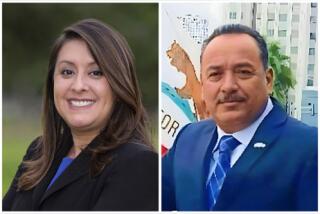Berman Weighs Mayoral Race Against Riordan
- Share via
WASHINGTON — Foreign ambassadors stop by his office to talk international affairs. C-SPAN cameras catch him maneuvering legislation through Congress. The White House invited him to a fancy state dinner with the president of France.
After nearly a decade and a half in the House of Representatives, Rep. Howard L. Berman (D-Panorama City) has built a reputation as a skilled legislative tactician with a firm grasp of a variety of issues and contacts on both sides of the aisle.
So why is he considering running for mayor of Los Angeles?
The reasons are myriad, from diminished political clout to an intense lobbying campaign by his wife. But before Berman decides to launch a challenge to Los Angeles Mayor Richard Riordan, he must look inside himself to find the motivation.
“In the end, if you strip it all away, I have to decide whether in my gut it is something I want to do,” he said.
Berman, who announced last month that he was mulling a Riordan challenge, says he would probably stay put in Washington if he believed that the Democrats would regain majority status in the House this November. When the Republicans took over the House and Senate in 1994, they shunted Democrats to the margins of the legislative process, sending the job satisfaction level of Democrats plummeting. Numerous lawmakers have decided to retire.
Berman has made the best of the change, scoring scattered legislative victories. But he is still forced to spend most of his time playing defense, trying to tone down GOP initiatives instead of advancing his own.
Then there is Berman’s cross-country trek from home to office.
Unlike other veteran lawmakers who keep their primary residences near the Capitol, Berman lives in his congressional district. Every Thursday night or Friday morning, he catches a plane home to Valley Village, a community that abuts North Hollywood, only to return to his Capitol Hill apartment in time for business Tuesday morning.
Occupying the mayor’s office would cut a few thousand miles off his commute and please his wife, Janis, who is tired of the arrangement and eager to see her husband occupying the mayor’s third-floor office suite in City Hall.
Janis Berman served briefly as Riordan’s director of governmental relations near the start of the mayor’s term. But she was fired from the post by Riordan’s then chief of staff William McCarley, a move that angered both Bermans.
The congressman, however, insists that his relationship with Riordan is cordial and that his candidacy, should it materialize, would not be based on any grudge.
“I think we have an amiable relationship,” he said. “This isn’t about how we get along, it’s about where L.A. should be going and whether I have a different idea or not that I want to pursue.”
If he runs, he could keep his name on the November 1996 congressional ballot and return to his current post if Riordan prevailed.
Even if he decides it is the right career move in 1997, he must determine whether it’s possible in purely political terms. Although state Sen. Tom Hayden (D-Santa Monica) and Councilman Mark Ridley-Thomas are both considering mayoral bids of their own, it is Berman who political analysts say would be the strongest Riordan adversary.
The Riordan camp, however, is confident that it can defeat any challengers.
“Dick Riordan will be reelected,” said William Wardlaw, a top Riordan advisor. “I can’t think of anyone who will beat Dick Riordan. He has done a very good job. He is very popular. He will outspend any competitor by at least 2 to 1.”
Those pushing Berman to run, including Ridley-Thomas and other council members, paint this scenario: African American leaders, many of them critical of Riordan’s performance in the black community, would help deliver the about 16% black vote to Berman, who has strong ties to a variety of black elected officials. Berman could tap his strengths among Jewish voters, those in the San Fernando Valley, union members and others who helped elect Riordan in 1993.
“The conventional wisdom is that Riordan has a lot of money and can’t be beat,” said political consultant Joe Scott. “But this is still an overwhelmingly Democratic city, and Riordan’s support is soft.”
Not all of those contacting Berman are so enthused. A Berman candidacy would tear at many of the congressman’s longtime allies who are active in the Riordan administration. Some of them tell Berman to wait four years until 2001, when term limits would force Riordan out and the job would be up for grabs.
That’s not lost on Berman’s mind. Neither is the fact that Riordan’s war chest is awash in cash and that, with the Riordan campaign seeking to bring political consultant Don Sipple aboard, the mayor would probably come out swinging.
Sipple, now working for the presidential campaign of Senate Majority Leader Bob Dole (R-Kan.), is the strategist who produced the television advertisements for Gov. Pete Wilson showing immigrants illegally crossing the border. “They keep coming,” the announcer said, capitalizing on an issue that sent Wilson soaring over former state Treasurer Kathleen Brown.
With Berman as the target, the Riordan camp could poke the longtime congressman for his 67 overdrafts in the House bank, for tax increases he has supported over the years, for helping to formulate the amnesty law in 1986 that gave legal status to millions of undocumented immigrants.
Although Berman may be a mover in the House, how many people in San Pedro or South-Central or West Hills know his legislative record?
The Riordan camp has conducted internal polling that they say suggests that Berman would have little chance of ousting the mayor. The majority of voters have not heard of Berman before, according to the Riordan campaign poll.
Berman acknowledged that a member of Congress is often little known back home.
“I think most people in Los Angeles don’t know the name Howard Berman,” he said. “Part of it is a consequence of the media. The fact is, a member of a big-city delegation in Congress gets very little publicity good or bad.”
He is, however, known in Washington.
Just last month, Berman showed his persuasive powers and ability to work with members of the opposition party in killing two provisions in the House immigration bill. He led the effort to keep legal immigration at its current levels and to defeat a proposed guest worker program that would have allowed growers to bring as many as 250,000 foreign workers into the country to pick crops.
Berman has long had a knack for connecting far-flung issues with his hometown. And if he can work with both Rep. Henry J. Hyde (R-Ill.) and Rep. Maxine Waters (D-Los Angeles) in the House, his backers ask, why couldn’t he connect with both Hal Bernson and Rita Walters on the council?
Berman is the ranking Democrat on the subcommittee dealing with Asia and the Pacific and has used the new position to make contacts with immigrant communities in Los Angeles.
Berman has used his seat on the Judiciary Committee, meanwhile, to help city police departments use drug forfeiture money to pay for the salaries of narcotics officers. Just like Riordan, Berman has pushed for more police officers by championing the Clinton administration’s COPS program.
It is police staffing that would probably become a battleground in a Riordan-Berman contest.
Riordan had pledged to boost the Los Angeles Police Department by 3,000 officers or forgo a second term. He has not come close, and Berman advisors are already relishing a television commercial asking: “Where are the cops?”
With much to mull over, Berman realizes that valuable seconds are ticking away.
The primary election is a year away--a long time unless one dwells on the amount of money that he would have to raise and the organization that he would have to build to unseat a multimillionaire with ties to many of the same people Berman would depend on.
The House is in recess through April 16, and Berman says he’ll spend the bulk of that time mulling his political future.
Instead, he will do the same thing he does many times a year before voting on a difficult piece of legislation--he’ll weigh the pros and cons. And then, probably by month’s end, he’ll cast an “aye” or a “nay.”
More to Read
Get the L.A. Times Politics newsletter
Deeply reported insights into legislation, politics and policy from Sacramento, Washington and beyond. In your inbox three times per week.
You may occasionally receive promotional content from the Los Angeles Times.










